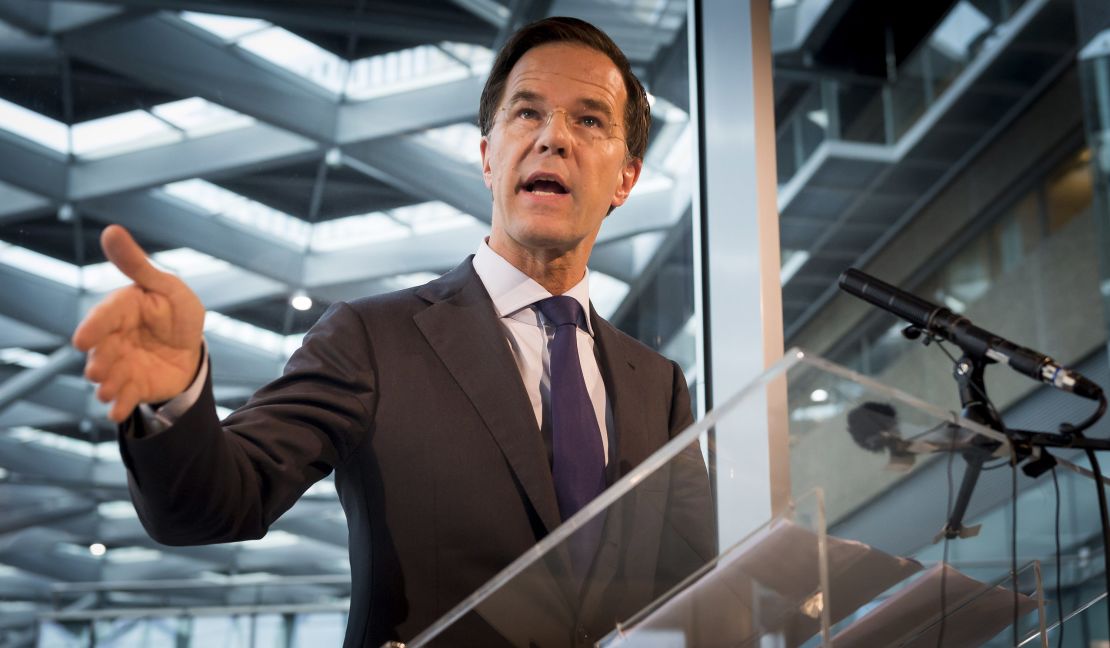Dutch voters will go to the polls on March 15, in an election that will be watched closely as a bellwether for populism in Europe.
The campaign – dominated by immigration and the Netherland’s membership of the European Union – has pitted two party leaders against each other, liberal incumbent Mark Rutte and populist far-right figure Geert Wilders.
Rutte’s Party for Freedom and Democracy (VVD) party has a small lead over Wilders’ Freedom Party (PVV), according to the latest Peilingwijzer poll of polls by Leiden University.
But even if Wilders comes out with more votes than Rutte, he is unlikely to be the next Dutch prime minister.
Here’s what you need to know.
Who are the key players?
Wilders – branded a “Dutch Trump” – has enjoyed a meteoric rise from the political fringes to frontrunner.
He made his name internationally in 2008 with the provocative online film “Fitna,” which juxtaposed the aftermath of terrorist attacks with verses from the Quran.
As leader of the Freedom Party, Wilders wants to stop immigration from Muslim countries, close mosques, ban the burqa and imprison radical Muslims who have committed no crimes on a “preventative” basis.
Wilders, 53, has also promised a referendum on the Netherlands’ membership in the EU, following Britain’s Brexit vote last year.
His biggest threat is the incumbent Prime Minister Rutte, who has touted the country’s economic stability under his People’s Party for Freedom and Democracy.
The European Commission forecasts the Dutch economy will grow steadily at around 2% this year, outperforming the EU as a whole.
Rutte, 50, is seeking a third term in power – his party won a second term in 2012 after forming a coalition with the center-left Labour Party, which has lost significant support this time around.

But Rutte appears to have pushed himself to the right to compete with Wilders, rather than branding himself as Wilders’s opposite.
In January, Rutte wrote an open letter in which he said immigrants who did not assimilate in the Netherlands should “behave normally, or go away.”
While he does not agree with Wilders on pulling out of the EU, he has said the concept of an ever closer union – an EU rallying cry for nearly 30 years – was “dead.”
What are the key issues?
Asylum seekers and immigration, membership of the EU, and crime and security are the most important issues in the election.
The electorate has also focused on civil liberties – issues such as privacy, freedom from racial profiling and police checks in the streets – this comes on the back of an anti-terror drive.
“These issues are all related. Asylum seekers, civil rights and freedoms are of course related to the EU. Crime and terrorism, and talk of taking back control – all these issues are right-wing issues that have completely dominated discussion. There has been little space for left wing issues,” explains Andre Krouwel from Vrije Universiteit in Amsterdam.
But beyond the Netherlands’ borders, support for Wilders is of concern, especially if he does find a way to the premiership and holds his promised referendum.
After Britain voted to pull out of the bloc, some other member countries have threatened to hold similar votes over concerns such as migration.
Could Wilders be Prime Minister?
It’s unlikely.
Even if Wilders comes out with the most votes, no party will win a majority to form government in its own right. A coalition is inevitable.
In this situation, Parliament could give Wilders the right to try and form a coalition, but he simply doesn’t have the allies in parliament, Krouwel said.
“Imagining that he gets around 15% or so of the vote, the other parties he’ll need in his coalition will be even smaller, so he’ll need at least three or four parties to join him. If you can find even one, I challenge you to find two, let alone three or four,” Krouwel said.
Dutch parties have indicated that they would not team up with Wilders, and those who have entertained the idea have said they will only do so if he drops his anti-immigration stance – the centrepiece of his manifesto.
What’s more likely is that parliament will appoint a veteran politician to oversee the coalition negotiations. Even if Wilders’s party has the most votes, Rutte’s party, if it comes in second, will likely form a coalition and stay in power.
A long negotiation process to form a coalition is expected – three months is normal and in the past more complex alliances have taken seven months to form.
While that’s happening, the current government remains in power, though it cannot easily introduce new policy to Parliament.
How many seats are up for grabs?
The short answer is 150. What’s not so simple is how they are won.
The Dutch system allocates seats to parties through a proportional system. The seats are handed out to parties based on the percentage of votes they received. For example, if 10 million people vote and a party gets 15% of that vote, it will get 15% of the seats.
The party can select up to 60 party members to appear on the ballot. It is those people in that order who take seats in Parliament.
But there is an exception – if any member reaches a certain number of what are known as preferential votes, he or she jumps up in the queue and can possibly bump someone from a seat.
So Parliament in the Netherlands is not a house of lawmakers who necessarily represent a certain community. But the upside is they are more likely to get things done.
“There is a tight control over who sits in Parliament, which is why there is high party discipline in the Netherlands. If you don’t toe the line, you will be thrown out in a minute,” Kouwel said.







